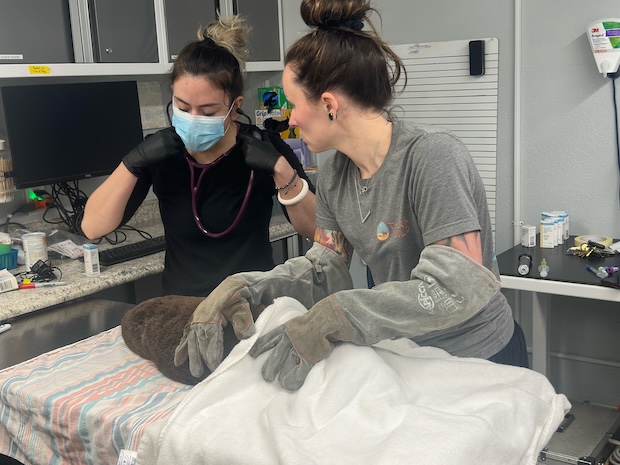Guest column: HB 2977 “1% for wildlife” is a lifeline
Published 7:00 am Sunday, June 1, 2025

- Staff at Think Wild try to save the life of an otter. (Think Wild Central Oregon)
On May 25, over the Memorial Day weekend, a passerby found a severely injured river otter on the side of Highway 97 just north of Bend, near Tumalo Place and Deschutes Junction. The otter looked dead, but the driver noticed slight movement and contacted the Deschutes County Sheriff’s Office, who brought him to Think Wild for emergency care.
The adult male river otter had suffered extensive trauma, likely due to being hit by a car: head injury, eye damage, a broken tooth, and respiratory distress. Despite around-the-clock veterinary treatment for two days, the otter’s condition worsened, and by Monday night, he died.
While tragic, this case is not unique. Each year, Think Wild treats 1,000 injured and orphaned native wild animals and responds to almost 5,000 calls — most occurring during the summer months when the influx of tourists to Bend increases both human-wildlife conflict and the demand on our natural resources.
Otters rely on rivers and wetlands, but they often travel overland — sometimes miles — to find food, shelter or appropriate habitat. This otter was found several miles from the Deschutes River, likely crossing farmland, irrigation canals, and busy roads to reach their destination before meeting their fate of a passing car. Unfortunately, growing development and human disturbance (especially during the busy holiday weekends) are increasingly forcing wildlife in these lethal situations.
As the executive director of Think Wild, I see firsthand the consequences of tourism-related congestion on roadways or hikers and campers in sensitive habitats. And it’s not all a negative – tourism is vital to our economy, and at Think Wild, we love hosting birdwatching, wildlife tracking and wetland tours for visitors.
But the resources needed to invest in and sustain our natural places simply haven’t kept pace. In 2023, travel spending in Oregon soared to an all-time high of $14 billion. Meanwhile, the Oregon Department of Fish and Wildlife’s conservation budget is being cut — even as an unprecedented number of our fish and wildlife species face decline or extinction. We’re setting new tourism records while slashing funding for the very fish, wildlife, and habitats that attract visitors to Oregon in the first place.
There’s an anti-tourist undertone in Bend that is often joked about on social media (just check the r/Bend subreddit or @bendcalifornia on Instagram). I’m not condoning it, but it gives insight to many Oregonians’ frustrations with watching our loved places and wildlife be promoted and overburdened without equal investment in their conservation. Tourism is vital to our economy, but it must also be part of the solution.
That’s why House Bill 2977, 1% for Wildlife, is so important.
HB 2977 proposes an increase to the state’s transient lodging tax from 1.5% to 2.5%, with the extra estimated $30 million generated going to a dedicated fund directed by ODFW for the conservation and recovery of Oregon’s threatened species and habitats. Most overnight lodging stays are made by out-of-state visitors, meaning the majority of funds would come from tourists — not local residents or businesses.
Even with the modest increase, it would still be one of the lowest statewide lodging taxes in the country. Oregon has no statewide sales tax, so tourists pay little toward maintaining the natural resources they come to enjoy. HB 2977 gives them a chance to give back and ensure that Oregon’s incredible hunting, fishing, hiking, and recreation opportunities are sustained for decades to come.
The river otter is just one example of the wildlife that could be protected by this modest 1% lodging tax, leading to investment in wildlife crossings, public outreach, habitat restoration and more. At a time when our public lands, fish and wildlife are more threatened than ever, HB2977 offers a fair and reliable funding stream for the very things that make Oregon special.
Sally Compton is the executive director of Think Wild.






